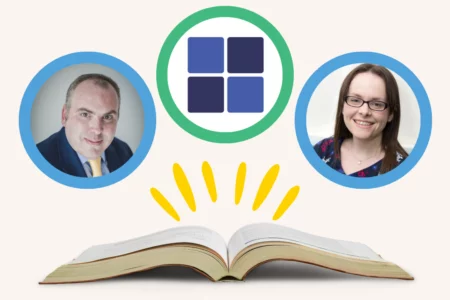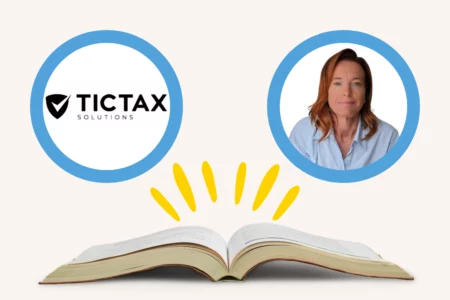Because of this specialism, he has many years of experience in preparing R&D tax relief claims for his clients, as part of the bigger picture of supporting tech start-ups as they grow, raise investment and make their first sales.
But experience doesn’t mean plain sailing
Stephen tells us
At Accountech, we have processed many R&D Tax Credit Claims – over £3 million of claims in the past 6 years – but we had our first ever (randomly selected) enquiry in May this year. Fortunately, the outcome was positive – HMRC congratulated us on the quality of our reports and record keeping.
However, they had a second enquiry later in the year – one of the now-notorious FIS letters, accusing their client of fraud. HMRC sent these out en masse to identify fraudulent claims, and inevitably some were sent to legitimate claimants. That enquiry was eventually settled a number of months later with the full amount of the claim paid – another favourable outcome.
The anxiety that this created, and the extra work required, meant that Stephen wanted more support and guidance with handling the enquiries. He also wanted to make sure that his firm was clearly identified as a quality provider.
As a result, Accountech joined The R&D Community in June 2022, and since then their team have taken training courses, joined webinars, called our R&D Helpline, and been enthusiastic participants in our community forum on WhatsApp.
Already they’re seeing the benefits
We asked Stephen what he thought of his experience as a member so far.
The training courses are of a very high standard and have been useful in both onboarding staff who have not done R&D tax credit claims before and as a refresher to keep our more experienced staff continually up to date. The technical aspect of the training is excellent, but equally helpful is the explanation of context and core principles of the legislation, which makes us more confident when reviewing our clients’ eligibility.
We’ve heard this from other members too. Getting your first enquiry, or getting a few close together, can be a blow to the confidence, and lead to advisors feeling like everything is suddenly riskier than before.
Related: Course overview – Establishing Eligibility
Stephen has also found our community forum “very helpful to share knowledge and views on proposed changes in the legislation and on changes to the way that HMRC are handling claims with other advisors.”
Getting a better deal for clients
Stephen’s clients typically have a high level of technical expertise and tight budgets as early-stage tech companies. So he uses a model where he supports them to prepare their own technical descriptions of R&D projects, and helps them to understand the nuances of HMRC’s guidance. The materials from the R&D Community have been very helpful in doing this:
We find the templates included in the training for obtaining information from clients on R&D projects to be extremely valuable as they steer them towards the aspects of the projects which HMRC need to assess and so make our own job easier.
Because the clients are doing more of the work themselves, Stephen can offer better rates than his competitors, which is great news for him and his clients.
However, there’s more to winning business than simply competing on price. This brings us to another reason why Stephen’s excited to be a member of The R&D Community.
With the recent revelations about the abuses of the R&D tax credit scheme, it is becoming vital for Accountants and R&D Tax Credit Advisors who use the scheme as it was intended to differentiate themselves. The R&D Community provides that badge of quality that smaller firms need to show their clients that they don’t need to only use larger more expensive advisors for their R&D Tax Credit Claims, if they’re seeking out quality advice.
Improving standards in the R&D industry
Stephen is not the only one concerned about abuse of the scheme – after widespread fraud and error was reported recently in the national press, SMEs and other advisors are increasingly concerned about HMRC’s regulation of the scheme, and they’re motivated to do what they can to improve standards.
Here at The R&D Community, that’s central to our mission. From the very start, we’d felt it was unfair that advisors who pay close attention to the rules are losing business to those who play fast and loose with the scheme. We wanted to do something positive by supporting advisors who want to do R&D to the absolute best of their abilities.
Our approach to this is 3-fold.
First, our training and support resources help advisors to understand and apply the rules of the scheme as accurately as possible, raising the standard of advice they’re able to offer as individuals.
Second, we are creating the UK’s first certification in R&D tax relief, which will start to lay the groundwork for self-regulation and a higher standard of practice.
Thirdly, we are collaborating with our members to understand their concerns more broadly and seeking out every opportunity to respond to HMRC consultations, participate in their R&D Communication Forum, and press for better legislation and oversight of the scheme.
This latter element of our work feels especially valuable to Stephen, who said
Having a coordinated response when the Government asks for feedback is also likely to be far more effective in increasing our influence and also encourages consideration of every aspect. It is more important than ever to effectively lobby the Government about the importance of the R&D Tax Credit scheme after the reduction of the benefit of the SME scheme in response to recent abuses and questions over the scheme’s effectiveness and value for money.
Sounds like a good fit?
If you’ve been reading Stephen’s story and feel like you share the same challenges and values, we’d love to welcome you to the community too. You can:
- See all the details of what’s included and how much it costs
- Read about everything you need to know before you join
- Address concerns you might have about joining
- Download our prospectus to share with your colleagues
- Sign up for The R&D Review, our free newsletter, for insider insights and updates about new courses
We hope these resources will answer all your questions, but if there’s anything you’d like to discuss, please get in touch and let us know!





